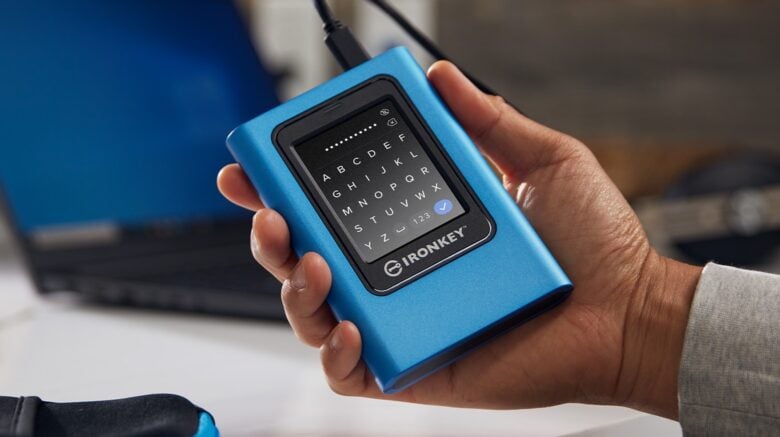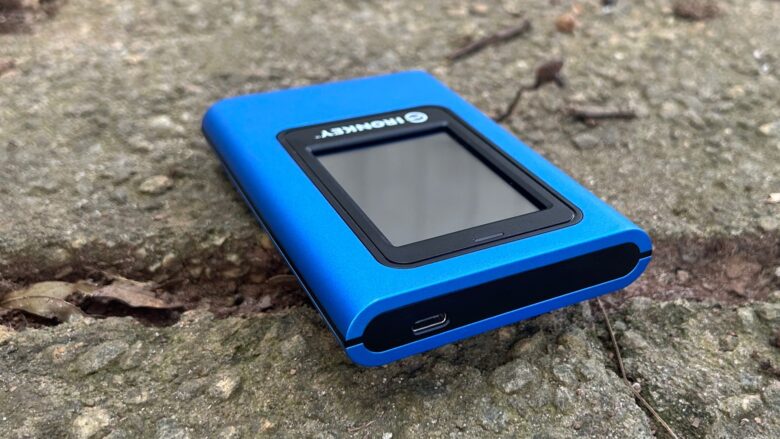The Kingston IronKey Vault Privacy 80 External SSD includes a touchscreen and hardware encryption to protect user data. Unlock it by tapping in a password or numeric passcode onto the touchscreen.
It’s available in capacities ranging from 480GB to nearly 2TB. And it’s accessible from just about any device with a USB port — no special software needed.
I went hands-on with the secure SSD. Here’s why I like it.
This post contains affiliate links. Cult of Mac may earn a commission when you use our links to buy items.
Kingston IronKey Vault Privacy 80ES review
Cloud storage is convenient, as long as you can count on a constant internet connection. And it’s secure, as long as you use a service like iCloud that encrypts files.
But nothing is as secure as an encrypted SSD that only you have access to, like the Kingston IronKey Vault Privacy 80ES.
And the fact that you can unlock and decrypt files simply by typing in a passcode on a touchscreen makes it very easy to use.
- Larger than your average SSD
- Works with virtually any USB device
- Encrypted SSD with speedy file transfers
- Hard-core security
- Kingston IronKey Vault Privacy 80ES final thoughts
- Pricing
Larger than your average SSD
Before going any further, you’ll have to accept that this accessory is larger than a typical external drive. But SSDs with on-device encryption are always bulkier than average.
In the case of the IronKey Vault Privacy 80ES, the hardware is 4.8 inches by 3.3 inches by 0.7 inches. It actually reminds me of the original iPod in size and design, just without the scroll wheel
Kingston’s drive weighs in at half a pound, and it’s reasonably portable. But it’s not nearly so easy to carry around as the OWC Envoy Pro or Samsung T7. Just don’t forget, neither of those SSDs offer encryption.
Maybe consider the bulk part of the security system. You’re less likely to overlook that you’re accidentally leaving something this large behind.
The touchscreen is 2.25 inches by 1.7 inches. That’s large enough to make the letters and digits on the display easy to press. Kingston suggests you use a stylus if you have trouble.
The advantage of a touchscreen over physical buttons is you can put in a password or a numeric PIM — it’s your choice. In addition, the letters/numbers can rearrange themselves every time you unlock the IronKey Vault Privacy 80ES. No one can guess your passcode by pressing the dirty spots on the screen from previous uses.
The accessory’s metal casing comes in a shiny blue. I learned from experience that the paint will scratch if you don’t keep the drive in the zipper case that comes with the peripheral.
Works with virtually any USB device

Photo: Kingston
Kingston built the hardware necessary to encrypt and decrypt files into this SSD. That means the computer you connect it to doesn’t have to do anything special. Once you’ve typed in the passcode, the drive acts like any other.
I tested it with an iPad, a Windows PC, and even my Roku. All of these could access the drive once I unlocked it.
The Kingston IronKey Vault Privacy 80ES attaches to computers via the USB-C port on its top edge. It comes with an 18-inch USB-C cable that works well.
But the accessory isn’t limited to USB-C. There’s also an 18-inch USB-A cable in the box so you can attach the peripheral to older computers. I tested to be sure: that’s how I connected it to the Roku.
Unplug the SSD and it’s instantly encrypted again. You’ll need to put the passcode in again to access your encrypted files.
Encrypted SSD with speedy file transfers
One of the typical advantages of storing files on an SSD over putting them in the cloud is faster transfers. You can almost always get large files off or on a local drive much quicker than downloading or uploading them over the internet. My testing shows that’s true for the Kingston IronKey Vault Privacy 80ES.
It supports USB 3.2 Gen 1, which means files transfer at a maximum of 5 Gbps. But I wanted to test real-world performance.
Copying a 1GB test file from my computer to the IronKey Vault Privacy 80ES took 5 seconds. It transferred back just as quickly. That round went so well I moved to a 10.7GB test file. That moved from computer to Kingston SSD in 46 seconds. The trip in the opposite direction took 45 seconds.
Support for USB 3.2 Gen 2 would have made the drive faster, but probably wouldn’t affect daily use very much.
For comparison versus cloud storage, I copied the 1GB test file from iCloud to my computer. It took over 10 minutes.
Hard-core security

Photo: Ed Hardy/Cult of Mac
The Kingston IronKey Vault Privacy 80ES is bulkier than typical SSDs, and you have to put in a passcode every time you use it. The extra hassle wouldn’t be worth it if it couldn’t really secure your files. Fortunately, it can.
It provides XTS-AES 256-bit encryption using a Common Criteria EAL5+ (CC EAL5+) certified secure microprocessor, and is TAA-compliant. The drive is FIPS 197 certified and can handle Brute Force attacks and BadUSB with digitally signed firmware.
Kingston designed the accessory so companies can give them to employees and block them from using it stupidly. It offers separate Admin and User passwords, and the Admin account can set rules like a maximum number of shared password attempts, a minimum password length, auto-timeout to lock drive, randomize touch-screen layout and Secure-Erase.
Kingston IronKey Vault Privacy 80ES final thoughts
Based on my testing, if you want to carry around nearly 2TB of data on an SSD that’s securely encrypted so that no one but you (or your employees) can access it, Kingston’s VP80ES is the way to go.
★★★★☆
It’s bulky, though. And while pointing out that file transfers could be faster is a bit of a nitpick, it’s true.
Pricing
The Kingston IronKey Vault Privacy 80 External SSD is available in 480GB, 960GB, and 1920GB capacities. The list price for the smaller capacity version is $229.99, the mid-tier one is $279.99, and the nearly 2TB version is $369.99.
At the time of this writing, you can find significant savings on Amazon. The 1920GB version costs $269.99, for example.
Buy it from: Kingston
Buy it from: Amazon
Kingston provided Cult of Mac with a review unit for this article. See our reviews policy, and check out more in-depth reviews of Apple-related items.
![Kingston’s securely encrypted SSD unlocks with built-in touchscreen [Review] Kingston IronKey Vault Privacy 80 review](https://www.cultofmac.com/wp-content/uploads/2023/07/Kingston-IronKey-Vault-Privacy-80-review-1536x864.jpg)


